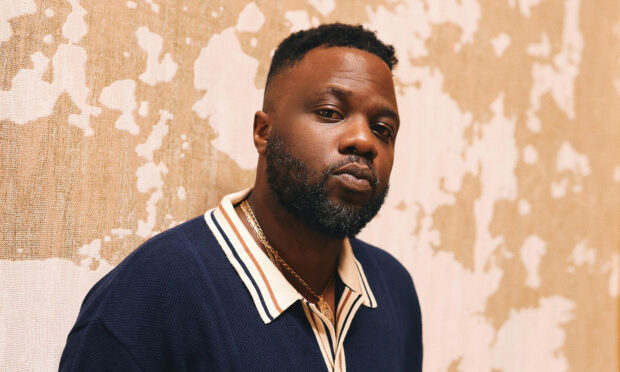
It’s a Friday afternoon in the middle of January, and Tunji Balogun ’04 is multi-tasking. He has one hand on the wheel of his car and a Zoom call going on his phone, as he navigates to a local In-N-Out Burger for his first real meal of the day. His schedule as the CEO and chairman of Def Jam Recordings does this, sometimes: keeps him busy enough that he can’t fit in lunch until after 3 p.m.
On this particular Friday, though, Los Angeles is still reeling from the spate of wildfires that have burned up tens of thousands of acres of land across the county. The sky is blue, but you can still taste the ash in the air. So as he drives, Balogun is reflecting on his place in the order of things: what it means to dedicate your life and career to creativity when the world is quite literally burning around you.
“I would say I’ve dedicated my career to trying to uplift forward-thinking, cutting-edge artists making Black music,” he says. To him, Black music is a loose and expansive category that cuts across genres, encompassing dance, R&B and pop as well as dancehall, reggae and hip-hop.
Balogun says that the fires that surround his city bring his vision of the power of art into clear focus. “In a chaotic, wild world, people need healthy forms of escape,” he says. “Music is one of humanity’s creations that brings us closer together [and] serves as a healing force. My approach has been to try to do my part and leave a legacy that I can be proud of.”
He’s done plenty of legacy-building in the first decade of his career. Since his first internship at Warner Records, which Balogun landed while still at Pomona, he’s helped launch the careers of artists including Kendrick Lamar, Khalid, Bryson Tiller, Doja Cat and SZA. Now his role at Def Jam means he’s in charge of shepherding the work of hip-hop luminaries such as LL Cool J and Public Enemy’s Chuck D as well as newcomers like Elmiene, who Balogun says has “one of the best voices I’ve heard in my life.”
But becoming one of music’s most influential tastemakers wasn’t the plan when he first got into the business. During that Warner internship, Balogun wasn’t thinking about eventually elevating into the executive suite—he wanted to learn the ropes in order to break through himself as a rapper.
But as soon as he got into the boardroom, Balogun realized that most of the other people there were business majors, not music obsessives. He, on the other hand, was already scouring the internet for up-and-coming acts at a time when that wasn’t yet common. He had an enthusiast’s deep-rooted knowledge combined with a fan’s earnest love of the work. And as Balogun surveyed the landscape around him, it became clear that he probably could have a bigger impact helping facilitate others’ careers than narrowly focusing on his own.
He felt like his liberal arts background made him particularly well-suited to the task. “I’m a studious, well-educated Nigerian-American kid who went to schools like Deerfield and Pomona,” he says now. “I’ve always kind of had dual citizenship. I’m in the creative community, but I also can go into board meetings and talk about quarterly finance projections.” That flexibility made him an ideal “translator” between corporate and creative.
He also felt a responsibility as a Black man in an industry that has historically exploited Black artists. “Something I noticed when I got my first internship was [that] there are a lot of artists who look like me, but not a lot of executives,” he recalls. “So there’s always been a goal in the back of my head to be an advocate and a strong voice for people who don’t really have a lot of people advocating for them.”
Tunji’s Take:
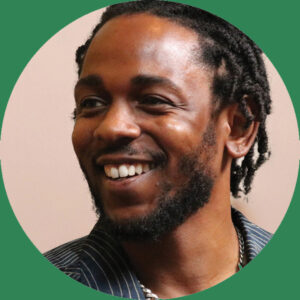 Kendrick Lamar
Kendrick Lamar
I got to work with Kendrick really early in his career. Seeing an artist like him who is such a great example of storytelling and forward-thinking, fearless art from an unapologetically Black American voice—that inspired me. It gave me the goal of, “OK, this is the type of stuff that I want to work on and be a part of throughout my career.”
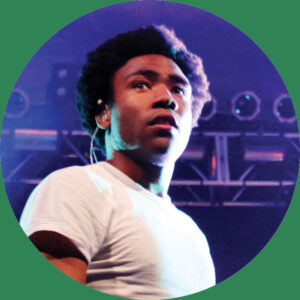 Childish Gambino
Childish Gambino
(actor Donald Glover)
He’s a renaissance man. That guy’s talented at everything. He’s a savant. He’s a writer, producer, singer, rapper, dancer, auteur. That dude’s just a “super-creative.” He’s the closest thing we have to a modern-day Sammy Davis Jr. And also the most gracious, down-to-earth, regular person.
 H.E.R.
H.E.R.
She’s another supreme creative. Singer, songwriter, producer, performer. I think she’s one of the most talented performers of her generation, and someone who has only scratched the surface of her range musically. She broke as an R&B act, but she can really play any genre. I was in the studio when she and Daniel Caesar wrote “Best Part”—one of the greatest songs I’ve ever heard in person. She’s otherworldly.
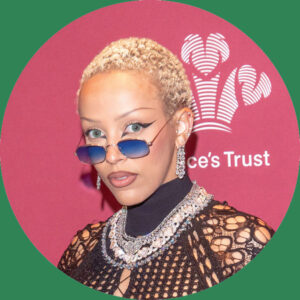 Doja Cat
Doja Cat
Doja is a world builder. She’s another one who’s sort of genreless. She broke as a rap act and a pop act at the same time, but she can really do anything. I think she’s underrated as a rapper—her songs are so big that people kind of discount her lyrical ability. She literally went from the fringes of the internet to being one of the most popular mainstream acts. And I love that she retains her “weird”—she’s never homogenized her style, even as she’s gotten bigger.
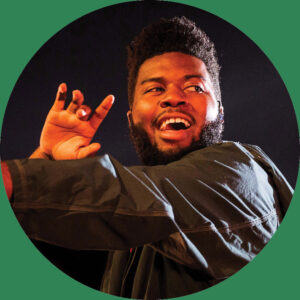 Khalid
Khalid
Khalid was a child prodigy. I think when he debuted people thought he was in his 20s or 30s because his voice was so deep and distinct. But I met him when he was 16, and we put out his album American Teen right after he turned 18. He’s another one whose genius I’ve been blessed to witness in person: I was in the room when he wrote songs like “Young, Dumb & Broke,” and “Talk” with Disclosure. He’s someone who’s wise beyond his years.
He’s been able to do that for many artists over the years—but often at the cost of his own creative pursuits. Dedicating himself to his job means that Balogun rarely makes his own music anymore. So he scratches that particular itch by collaborating with the artists he signs. It doesn’t always happen—Balogun never wants to insert his opinion where it’s not welcome. But “there are artists who I get really close with, and there would be a level of comfort where they knew that I made music, and then I could contribute as a songwriter,” Balogun says.
Sometimes that goes far enough that he earns an official songwriting credit, as he did on K CAMP’s double-platinum hit “Comfortable.” But more often he’s just in the studio spitballing, being part of the give-and-take of making something new. “Most of the time I won’t ask for or take credit,” Balogun acknowledges. “You’re my artist. If you win, I win.”
After his time at Warner Brothers, Balogun found his way to A&R Interscope, and moved from there to RCA, he went on what he calls “a special run of signings,” hooking up with artists including SZA, Childish Gambino and H.E.R. He went on to start his own label, Keep Cool, in 2018. That work earned him the chance to come aboard at Def Jam in 2022.
The idea scared him at first. He had a good thing going where he was, and the idea of taking on more responsibility—particularly on the business side—was intimidating. But ultimately Balogun opted into the opportunity to put his imprint on such a storied label. “Def Jam is one of the last labels that has a mandate to uphold Black music,” he says. “I just felt like I was being called to do the role. Spiritually it’s kind of what I’ve been trying to do this whole time.”
That transition also thrust Balogun from a largely behind-the-scenes role at RCA into a very bright spotlight at Def Jam. “RCA is an amazing label, and I had a great time working there, but no one’s checking that it is living up to the culture of what it’s supposed to be,” he says. “Things at Def Jam are scrutinized. People are checking to see the types of signings I’m making. I appreciate the accountability of it.”
The scrutiny remains intense, but he’s also come to appreciate the pressure. It reminds him of just how much Def Jam’s work matters to people, and the importance of continuous self-growth. “I tell my artists [that] you can’t get comfortable and think nothing’s going to change, because you blink and everything has shifted,” he says. “You have to remain hungry and uncomfortable in order to evolve.”
In addition to the specific pressure of life at Def Jam, Balogun also has to weather the storms of a business model that’s trying to figure out where it stands as album sales figures slump and races for TikTok virality reign. But he insists that he’s not one to chase trends, instead relying on finding good artists who make interesting work, and being patient in helping them find their audience. “I want to work with people who are staunchly themselves, no matter the platform,” Balogun says. “And then they figure out, ‘OK, how do I be myself on this new platform, as opposed to [changing] myself to fit the platform?’”
To that end, he’s less interested in digital dominance and more focused on finding fans wherever they are. “In music right now, success happens when creativity meets community,” he says. “If an artist can actually galvanize people who care about what they’re doing, those people become the ambassadors for their songs, for their albums, for their shows. They help spread your music. They put it on their stories, they run your fan accounts. You usually have to start small, but I find that most of the people who are successful in this era understand that it’s not about reaching the masses first. It’s about cultivating your own little world and double, triple, quadrupling down on it.”
As an example of this kind of fandom-building, Balogun points to rapper Doja Cat, who—long before the pandemic inspired many musicians to perform directly for fans online—was streaming on Instagram Live two or three times a week and making songs in her bedroom. “She really did build a bulletproof community of people who will never leave her, and then layered bigger and bigger songs on top of that.” he says.
It’s clear that as much as Balogun understands a balance sheet, everything he does comes from a deep-rooted passion for music and creativity. But even the hottest passions can burn out, especially when you have to engage with them in a professional setting, day after day. How does he keep the spark alive?
“I have to constantly revert to ‘Tunji the fan,’ and remember that, while all the industry stuff is cool, at the end of the day it’s really about the artist and the fan,” he says. “I have to remind myself not to overthink it. You won’t get burnt out [if] you actually love the stuff that you’re working on.”
When the non-music parts of the job threaten to take over, Balogun makes sure to follow up long days in the office with long nights in his studio staying on top of the latest themes and explorations in music. Some of his breakout picks from his current crop of artists at Def Jam include R&B singer Muni Long and Fridayy, who Balogun describes as a “hybrid artist” mixing R&B, Afrobeat and gospel. He’s also excited about Coco Jones, as well as LiAngelo Ball, whose brothers Lonzo and LaMelo are both NBA players. “He’s gonna have one of the best years in hip-hop,” Balogun predicts.
At this point in our conversation, Balogun has long since picked up his In-N-Out Burger; it’s cooling in the car next to him. More calls are coming through, and texts about an artist’s song leaking. It’s time for him to return to his work: the creative part, the corporate part, all of it. He’s tired, but he seems certain that he’ll be able to keep his compass pointed north, so to speak, even as he faces the challenges of a difficult job in an uncertain industry.
“I’ve been a fan, I’ve been an artist, I’ve been an executive, and all of those different experiences have informed my approach,” Balogun says. “Deep down, I’m still a fan, and still an artist. I’m not putting music together or making records or anything, but I think I have the heart and the soul of an artist.”
